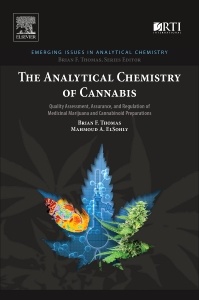Description
The Analytical Chemistry of Cannabis
Quality Assessment, Assurance, and Regulation of Medicinal Marijuana and Cannabinoid Preparations
Emerging Issues in Analytical Chemistry Series
Authors: Thomas Brian F., ElSohly Mahmoud A.
Language: English
Subjects for The Analytical Chemistry of Cannabis:
Keywords
Analytical chemistry; Cannabidiol; Cannabis; Cannabis constituents; Cannabis inflorescence; Cannabis sativa L; Chemical fingerprinting; Chemotype; Chromatography; Contaminants; Controlled substances; Dosage formulations; Drug control; Drug efficacy; Drug formulation; Drug labeling; Drug regulation; Drug safety; Drug social policy; Drug stability; Drug supply; Flavonoids; Good laboratory practices (GLP); Good manufacturing practices (GMP); Hashish; Indoor growing; Legal prohibition; Mass spectrom
Approximative price 47.28 €
In Print (Delivery period: 14 days).
Add to cartSupport: Print on demand
Description
/li>Contents
/li>Readership
/li>Biography
/li>Comment
/li>
A volume in the Emerging Issues in Analytical Chemistry series, The Analytical Chemistry of Cannabis: Quality Assessment, Assurance, and Regulation of Medicinal Marijuana and Cannabinoid Preparations provides analytical chemistry methods that address the latest issues surrounding cannabis-based products. The plethora of marketed strains of cannabis and cannabinoid-containing products, combined with the lack of industry standards and labelling requirements, adds to the general perception of poor quality control and limited product oversight. The methods described in this leading-edge volume help to support the manufacturing, labelling, and distribution of safe and consistent products with known chemical content and demonstrated performance characteristics. It treats analytical chemistry within the context of the diverse issues surrounding medicinal and recreational cannabis in a manner designed to foster understanding and rational perspective in non-scientist stakeholders as well as scientists who are concerned with bringing a necessary degree of order to a field now characterized by confusion and contradiction.
2. Biosynthesis and Pharmacology of Phytocannabinoids and Related Chemical Constituents
3. Medical Cannabis Formulations
4. Analytical Methods in Formulation Development and Manufacturing
5. Quality Control and Stability Assessment
6. The Roles of Research and Regulation
7. The Future of Cannabinoid Therapeutics
In 2019, he joined Canopy Growth Corporation as Senior Director, Analytical Chemistry, Discovery Sciences, and Pharmaceutics, where he had management oversight of drug substance and product testing to support preclinical and clinical studies of cannabinoids in accordance with regulatory guidance. He also directed the integration of medicinal chemistry and in vitro pharmacological screening approaches to support development of consumer products and drive clinical drug discovery and therapeutic product development and commercialization efforts. He was subsequently recruited by The Cronos Group to serve as the Director of Analytical Sciences, with management oversight of scientists at production and research and development facilities in the United States, Canada, and Israel. He also engaged with the US Hemp Roundtable and other trade and scientific organizations to provide critical input to regulations and regulatory oversight by state, federal, and international regulatory authorities. He is currently providing pharmaceutical consulting s
- Addresses current and emerging analytical chemistry methods - an approach that is unique among the literature on this topic
- Presents information from a broad perspective of the issues in a single compact volume
- Employs language comprehensible to non-technical stakeholders as well as to specialists in analytical chemistry




